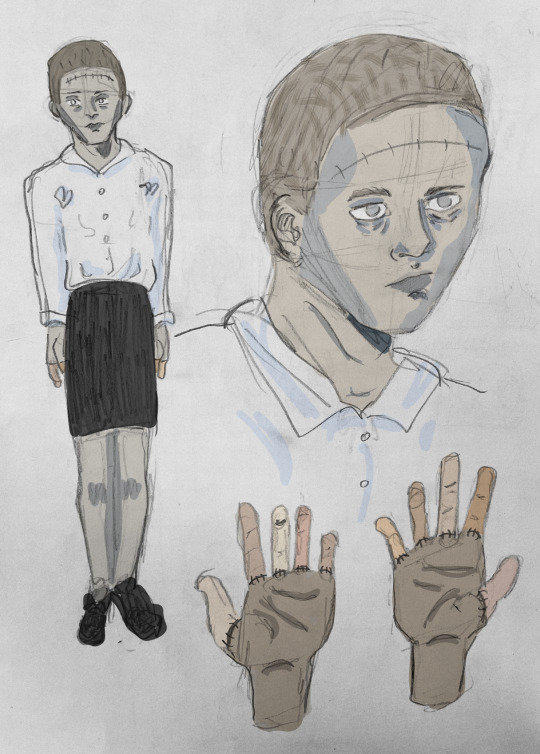#suit archive 81
Text
when theres 81 archives idk i never read the podcasr
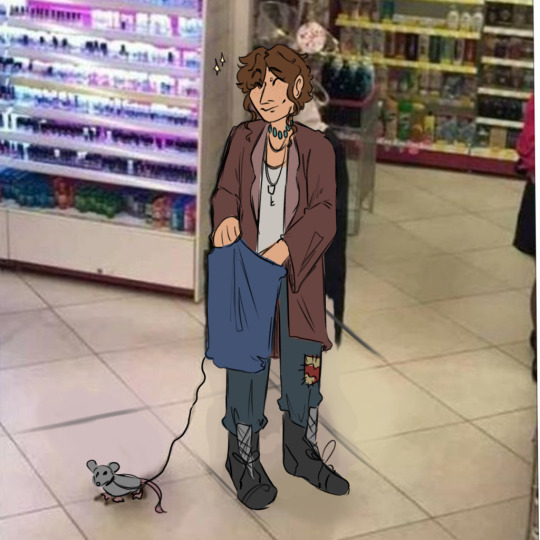

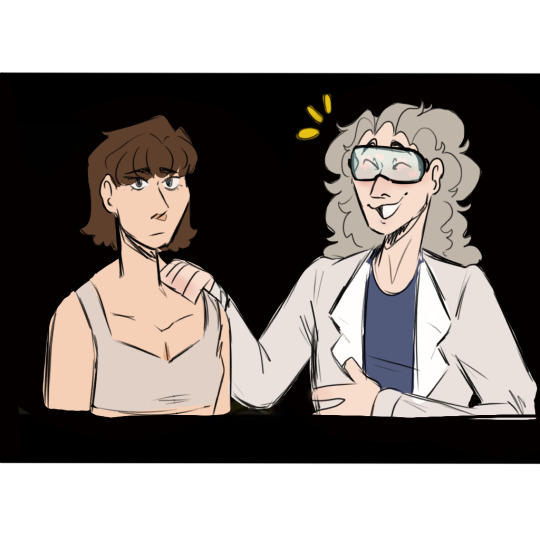

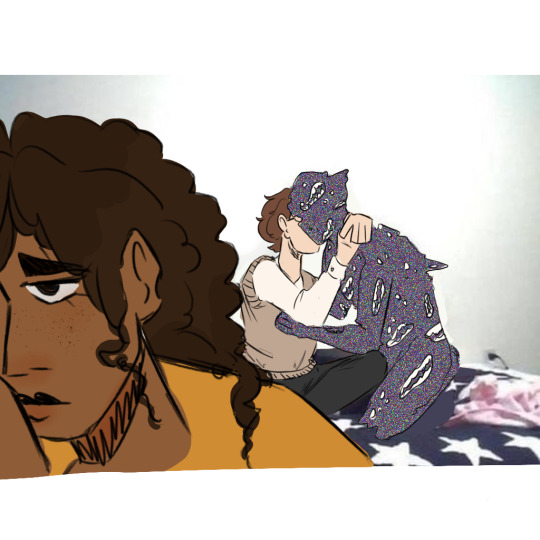
I’m going to revive this fandom if it kills me
#archive 81#a81#sonder archive 81#nicholas waters#caroline lesta#suit archive 81#rat archive 81#static man#morgan archive 81#lou archive 81
157 notes
·
View notes
Text
HELLO i was dead bc of uni BUT i managed to design some of the guys from a81 that i am totally normal about (spoilers untill s2 under the cut probably AND a cw for minor bodyhorror and injury/blood)
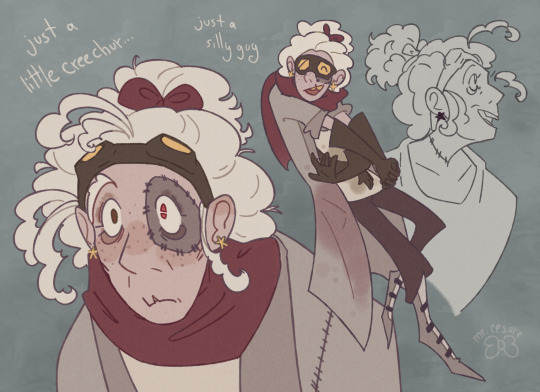
rat first!! i thought about his feet being a little animalistic so he can both walk normally and get in his tiptoes and skitter wghwgwhg

little doodle of trying to figure out how to draw dan
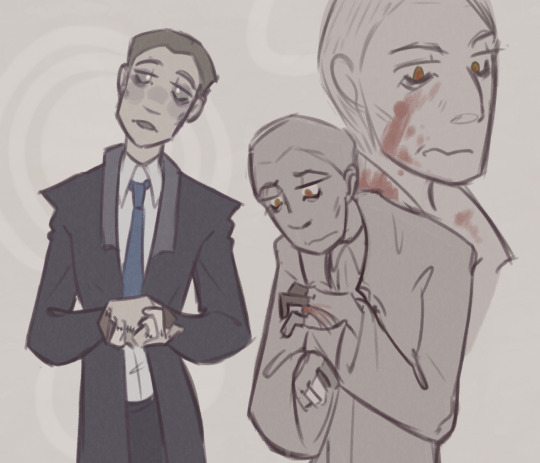
caroline lesta who is rotating in my brain constantly
thought ab lmg shaving her hair when they got her (in all of the aus i created to cope with the season finale she grows her hair back)

the boatwoman! wanted her to be a little like those statues on the ships?? and also wings that are referense to the messenger
#archive 81#a81#daniel powell#daniel powell a81#rat a81#rat archive 81#caroline lesta#suit archive 81#the boatwoman a81#the boatwoman archive 81#archive 81 fanart
80 notes
·
View notes
Text
thinking about how fucking kind and compassionate daniel powell is and tearing up because this dude made peach cobbler for ratty and was kind to rat, the creature that did painful body modification surgery on him without his consent, because he would want someone to be kind to him if he ever ended up losing his humanity like that and he gave rat his name and he made sure to call suit by her real name as soon as he found out what it was and he made small talk with clara and lou even though he knew they didn’t view him as human and he talked to suit about her memories and asked her if she needed help and he asked clara about her favorite albums and went through an extremely painful and fucked up ordeal and still came out the otherside a good person filled with trust and kindness like fuck bro he kept his humanity and his love for others and that’s fucking powerful!
#having emotions about daniel archiveeightyone in the club tonite#daniel powell#dan powell#archive 81#archive 81 podcast#archive 81 pod#a81#a81 podcast#a81 pod#horror podcast#rat archive 81#clara archive 81#lou archive 81#suit archive 81#ratty archive 81
316 notes
·
View notes
Text
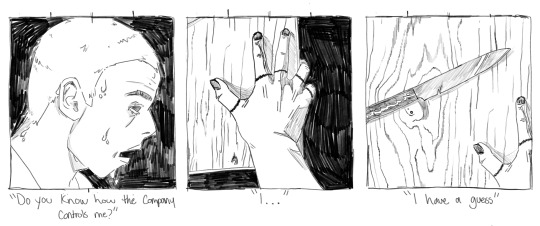
(wip) possessed by the spirit of relistening to archive 81 season 2
57 notes
·
View notes
Text
thinking about Caroline again. wondering when she changed her mind, decided she was too aberrant, too "other" to return to our world. because at some point, she was planning on coming home. on the boat, when she gave her fingers for passage, she told Dan that she would need assistance with physical tasks in the future. she was planning a future. at what point did that change?
#archive 81#a81#caroline lesta#caroline levi#suit#why must the canonicity of her name be so confusing.. :(
50 notes
·
View notes
Text
‘stood there is a thin, scrawny looking fly clutching a box. it is crudely dressed in an ill-fitting suit.’
not Jon reading Mr. Bluebottle to filth—
#the disrespect#please he just wanted to look nice#he even put on a suit to be fancy#no need to publically shame him#jon sims#jonathan sims#MAG 81#a guest for mr spider#tma#the magnus archives#rusty quill
24 notes
·
View notes
Note
How about Suit/Caroline?

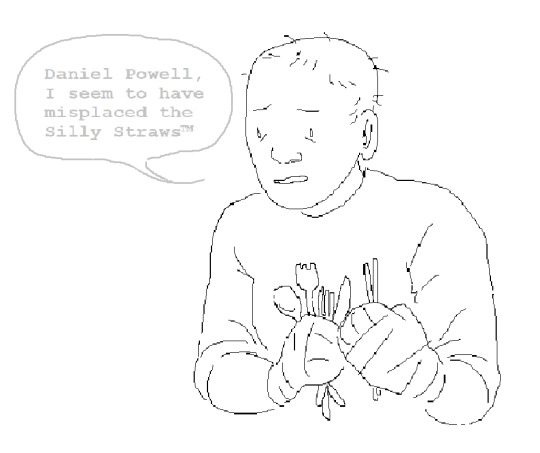
Send me a ✍ and a character and I'll draw the character horribly on MS Paint
109 notes
·
View notes
Text
The Overcoat of Arsène Lupin, is now available in English, transcribed into text from a single PDF scan of the story from Popular Magazine #81, v6.
This is, as far as I am aware, the only version of this story available in English besides the original PDF. You're welcome.
Links:
Read or download from the Web Archive.
Download (and, optionally, leave a tip) on Itch.io <-- now includes two audiobook versions!
Buy a physical copy from Lulu.com
@walks-the-ages, @internet--archive (thought you might like to be tagged, lol)
You can also read this short story under the read-more right here on tumblr. It is 9,051 words long, not including the title.
Summary, by me:
A crime so terrible it barely bears thinking about has been brought to the attention of cabinet minister Jean Rouxval, and he has taken it upon himself to bring those responsible for this horrible deed to justice.
But his plans to go it alone are brought up short when a detective by the name of Hercules Petitgris is assigned to assist him. Despite his poor appearance, detective Petitgris comes highly recommended. The suspects arrive, and Rouxval begins his interrogation, the proceedings watched over by the silent Petitgris as Rouxval takes the lead, driven by anger over the crime he has discovered. Little does he know that Petitgris got the case all worked out as soon as Rouxval started talking...
(Archived read-more link)
[read-more link was here]
The Overcoat of Arsène Lupin
Written by Maurice Leblanc,
“author of “The Hollow Needle,” “813,” “A Gentleman,” Ect.”
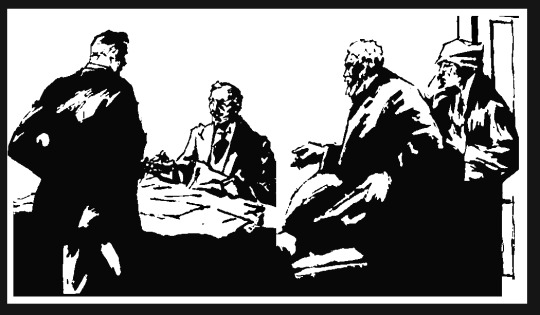
[Image description start: A black and white illustration with a black border, showing four characters.
One is a man sitting at a desk, in a suit and tie, gesturing with one hand, while another man stands in front of the desk with his back to the viewer, one hand on his hip.
Then a man and woman looking worried, the man with his hat off and hanging by his side, his other hand held out as he speaks, the woman with one hand to her face, the other clutching her chest.
Image description end.]
Hands behind his back, head sunk deep in the collar of his coat, his harsh countenance contracted in deep thought, Jean Rouxval nervously paced up and down the length of his vast study. At the threshold the chief page, detailed to the service of of cabinet officers, awaited orders. The minister betrayed by his short, quick steps, his drawn brow, his agitation, that he was shaken by emotion which assail a strong man seldom, and only at crucial moment of his life.
Stopping suddenly, he said to the page in a determined voice:
“A lady and a gentleman, no longer very young, will arrive presently. You will ask them to wait in the drawing-room. Shortly after I expect a gentleman, younger and alone. You will conduct him to the yellow room. They are neither to speak nor to see each other. You understand? I am to be notified at once of their arrival.”
“Very well, sir,” said the page, and withdrew.
Jean Rouxval’s political ability lay mainly in his tremendous energy, his attention to detail and a determination to know a bit about everything, whether it concerned his department or not.
Having enlisted almost at once in 1914 to avenge his two sons – both of whom had seemingly vanished from the field of battle – and the subsequent death of his wife, the war had given him an excessive sense of the value of discipline, authority, and duty. Affairs in which he was concerned always discovered him ready to undertake the most serious responsibilities and consequently found him assuming the greatest amount of power. He won the esteem of his colleagues, but they were also a bit wary lest the exaggeration of his good qualities might not drag the cabinet into needless complications.
He looked at his watch. Twenty minutes to give. He still had time to glance over the record of the frightful case which had caused him so much anxiety. Just then, however, he was interrupted by the telephone. He seized the receiver; the president of the council wished to speak to him.
He waited what seemed an endless time. Finally the president himself spoke. Answering, he said:
“Yes, Rouxval speaking, Mr. President.” He listened, seemed annoyed, and then replied in a bitter voice:
“Certainly, Mr. President, I shall receive the detective you are sending. But don’t you think I could have obtained the necessary information? Well, of course, if you insist, my dear president, and if this Hercules Petitgris is, according to you, a specialist in criminal investigation, he can attend the meeting I have arranged … Hello! … Hello! … Yes …. What? … My dear president. … This Petitgris may be… Really! Is it possible? Ah! Well, merely a supposition … That is-- Petitgris has all the perspicacity usually attributed to Arsène Lupin. … Yes, sir...Perfectly. … I shall wait for him. Hello! … You are quite right, my dear Mr. President. … The case is very serious, especially since certain rumors have already begun to be circulated. … If I do not arrive at an immediate solution, and if the truth of the matter is at all what we fear, it will be a frightful scandal and a disaster for the country. … Hello! … Yes, yes, rest easy, my dear Mr. President, I shall do the impossible to succeed. I will succeed. … I must succeed.”
After a few more words, Rouxval hung up, muttering between clenched teeth:
“I must! I must! What a scandal!” He was considering the various paths which might lead him to a successful solution, when he gradually became aware that some one was near him, some one who was not seeking to be noticed.
He turned his head and was dumbfounded by what he saw. All but next to him stood a shabby, wretched-looking individual, a poor devil, one might say, holding his hat in his hand in the humble attitude of a beggar asking alms.
“What are you doing here? How did you get in?”
“By the door, sir. The chief page was busy parking people right and left, so I beat it straight in.”
“But who are you?”
The stranger bowed respectfully and introduced himself:
“Hercules Petitgris – the specialist whom the president of the council just recommended to you, sir—”
“Oh, then you were listening?” Rouxval broke in peevishly.
“What would you have done in my place, sir?”
He was a sickly looking, pitiful object, sad-faced – his hair, mustache, his pinched nose, his thin cheeks, the corners of his mouth, all drooped pathetically.
His arms hung wearily in a long, greenish overcoat which seemed about to slip from his shoulders. He spoke in a disconsolate voice, not without care, but accenting certain words in a manner peculiar to the common people.
“I even heard you speak of me as a detective, Mr. Minister,” he continued. “Wrong, all wrong! I am not even on the police force. I was dismissed from headquarters for ‘weak character, drunkenness and laziness.’ Those were the terms of discharge.”
Rouxval was unable to conceal his amazement.
“I don’t understand. The president of the council has recommended you as a man with a disconcerting ability to diagnose clearly and correctly.”
“Disconcerting, Mr. Minister, is the right word. There are people who even believe I am Arsène Lupin, as the president was telling you. That is why some gentlemen consent to my services, in cases where no one has succeeded or could succeed, without looking too closely at my record or my character. Sure they say I am conceited and insolent to my employers. And then what? When one of my employers puts his foot in it and I see the point right off, haven’t I the right to tell him, have a little laugh on the side? On the level, Mr. Minister, I have turned down money more than once just to be able to bust right out laughing. They are funny! You ought to see the faces on them.”
In that melancholy face, under the drooping mustache, the left side of his mouth curled up in a little, silent sneer, uncovering a huge tooth – the tooth of a wild beast. It gave him a look of sardonic joy for a moment. With a tooth like that the possessor would bite, and bite deeply.
The minister was not afraid of being bitten, but the stranger certainly did not appeal to him, and if the president of the council had not so insistently recommended him, Rouxval would have gotten rid of him promptly.
“Sit down,” he said gruffly. “I am about to question three people and have them face each other in my presence. In case you have any remarks to make, you will make them to me directly.”
“To you directly, Mr. Minister, and in a whisper, as I always do when I always see my chief putting his foot in it.”
Rouxval frowned. In the first place, he hated people who did not know their place – like many men of action, he was very sensitive and keenly feared ridicule. Concerning his efforts the phrase “putting his foot in it” seemed particularly outrageous and almost an intentional menace. But he had already rung; the page entered. Without further delay Rouxval ordered the there people brought to him.
Hercules Petitgris took off his worn, green overcoat, folded it carefully and sat down.
The lady and gentleman were the first to enter. They were evidently aristocrats, and both in deep mourning; she, still young, tall and very beautiful, with a lovely face, pale and austere, framed in graying hair; he, slightly shorter, slim, elegant, his mustache almost white.
Jean Rouxval addressed him:
“The Count de Bois-Vernay, I believe?”
“Yes, sir. My wife and I received your summons, which I confess, startled us a bit. But may we hope it has no ominous portent? My wife is not very strong.”
He looked toward her with affectionate solicitude. Rouxval asked them to be seated and answered:
“I am sure everything will be suitably arranged and that Madame de Bois-Vernay will excuse the slight inconvenience I have caused her.”
The door opened. A man between twenty-five and thirty entered. He was of more modest mien, not very carefully dressed; his countenance, though frank and kindly, gave evidences of dissipation and weariness, confusing one’s estimate of his fair, broad-shouldered young man.
“You are Maxime Leriot?”
“Yes, sir, I am.”
“You do not know this lady and gentleman?”
“No, sir,” answered the newcomer, looking straight at the count and countess.
“No, we do not know this gentleman, either,” said the count in answer to a question of Rouxval’s.
The minister smiled. “I regret that this interview should begin with a statement which I am forced to disbelieve. But that little error will right itself at the proper time. Without haste and without undue delay over nonessentials, let us begin at the beginning.”
He opened the records on the table, turned to Maxine Leriot and in a slightly hostile tone said:
“We shall begin with you, sir. You were born in Dollincourt, Maine-et-Loire. Your father was a hard-working peasant who starved himself to give you a suitable education. The mobilization of 1914 found you a private in the infantry. Four years later you were an adjutant, with the croix de guerre and five citations for bravery. After the war you reenlisted. Toward the end of 1920 you were in Verdun. Your papers gave you credit for ‘ability as an officer.’
“But, about the middle of November, in the same year, came a bolt from the blue. One night in a third-rate dance hall, after opening ten bottles of champagne, you lost your head in a senseless brawl. You were arrested. You were taken to the post. You were searched. On you were found one hundred thousand francs. Where did you get that amount of money? You were never able to explain.”
Maxine Leriot protested:
“I beg your pardon, sir, I said that I had received the money from a person who wished to remain anonymous.”
“A worthless explanation!” said the minister. “Nevertheless, an inquiry was instituted by the military authorities. It came to nothing. Six months later, after obtaining your discharge from the service, you were again the center of another scandal,. This time your bill fold contained forty thousand francs in war bonds. And concerning these, too – silence and mystery. And again no explanation as to your means of livelihood or any reason for the dissipated existence you were leading. No position, no resources to speak of, yet money flowed through your fingers as if they supply were endless.
“The special detectives assigned to your case at the time could discover nothing, and you continued from bad to worse. Chance only, or a misstep on your part, could undo you. And that is what happened. One day, beneath the Arc de Triomphe, a man approached a woman who came there each day to pray, and said in a low voice, ‘I expect your husband’s letter to-morrow. Warn him – otherwise—‘
“The man’s attitude was surly, his tone snarling and menacing. The lady was frightened and quickly sought her motor. Must I specify that one of these persons was you, Maxime Leriot, and the other the Countess de Bois-Vernay, and only a moment ago you pretended not to know each other?”
Rouxval abruptly held up his hand. “I beg of you, sir,” he said to the count, who was about to interrupt, “do not try to deny the evidence. The episode occurred near me, for I also go regularly to the sacred tomb each week to pray for my sons. It was I who overheard the whispered threat; and it was for my own enlightenment, without knowing any of the facts which I have just related to you, that I undertook to discover who the man was, and the identity of his victim, in this too-apparently blackmailing scheme.”
The count said nothing. His wife did not stir. In his corner Hercules Petitgris nodded his head and seemed to approve the conduct of the investigation. Jean Rouxval, who had been watching him out of the corner of his eye, felt reassured. The tooth was not to be seen; therefore all was well. Rouxval continued, forging additional links in his chain of evidence.
“From the moment when circumstances placed the direction of this affair in my hands, it took quite a different turn, perhaps because I saw it in one light rather than another. Instead of Maxime Leriot, the man of to-day, I immediately saw the soldier of yesterday. His past interested me more than his present. Instantly, the moment I glanced at his record, two things struck me forcibly – a name and a date: Maxime Leriot was in Verdun, and he was there in the month of November, 1920 – that is, at the time when the anniversary of the armistice was to be celebrated and when most the solemn of ceremonies was about to take place.
“I went there and directed and inquiry on the spot, which proved neither very long nor difficult. His former battalion chief, whom I questioned, showed me an old order of that date over his signature, which also struck me forcibly. It seemed the key to the situation. The leader of one of the eight funeral cars, brought from eight different points along the great field of battle and bearing the bodies of eight nameless heroes, one of which was to be the Unknown Soldier-- this leader was none other than Adjutant Leriot himself.”
Jean Rouxval struck the desk with his fists, straining every muscle in his anger. Then in a muffled voice, deliberately emphasizing every word, he said:
“You, Maxime Leriot, were in the gallery of the fort where this historic ceremony took place; you were one of the guard of honor. Your heroism, your fame in military annals, caused you to be among those chosen for a part in this ceremony, amid the tricolor flags of your country and the trophies of victory in the great mortuary chapel. You – you were there—”
Overcome by emotion, Rouxval was forced to interrupt his vehement denunciation. It was necessary, moreover, to state facts more accurately and with less passion if the purport of his secret thought was to be clearly understood. Hercules Petitgris continued to nod his head approvingly, which only served to fan the flame of the minister’s ardor.
The former adjutant did not utter a sound. Like troops piercing an enemy line came Rouxval’s accusations. Hesitant, then stronger and stronger, and with greater force they had overwhelmed the foe before he could recover himself. The count listened and looked anxiously at his wife.
“Until this point in my investigation, I have only vague forebodings, no definite suspicions, no clews to lead me. I dared not understand. It was in this spirit, terrified, aghast, that I sought proofs of what I feared to know. These proofs were irrefutable. To begin: On All Saint’s Day, again the third of November, the fourth and the fifth, Adjutant Leriot, whose daily life I succeeded in reconstructing exactly, went, as soon as darkness had fallen, to an isolated inn.
“there he met a lady and gentleman with whom he remained in conference until dinner time. This lady and gentleman came to the inn in an automobile from a near-by city where they stayed at a certain hotel, the name of which I secured. I then went to this hotel and asked to see the register. From the first to the eleventh of November, 1920, two guests had been there – the Count and Countess de Bois-Vernay.”
A silence; the pallor of the countess deepened; Rouxval drew from the records two sheets of paper which he unfolded.
“Here are two birth certificates. The one of Maxime Leriot, born in Dolincourt, Maine-et-Loire, in 1895. That is yours, Maxime Leriot. The other, Julian de Bois-Vernay, born in Dolincourt, Maine-et-Loire, in 1895. That is your son’s, Monsieur de Bois-Vernay. Therefore, we may say, the same birthplace, the same age – two facts granted. Here is a letter from the mayor of Dolincourt. The two young men had had the same nurse. In youth they continued the friendship of their childhood. They enlisted at the same time. Again uncontestable facts.”
Rouxval went on reading from the documents as fast as he turned the pages.
“Here is the death certificate of Julian de Bois-Vernay; died in 1916 at Verdun. Here is a copy of the burial permit for the cemetery of Douaumont. Here is an extract of the report of Adjutant Leriot, who ‘brought back from a trench running along the road to Fleury-à-Bras and near an old surgical service station, the remains, in good condition, of an unknown infantryman.’
“Finally, here is a relief map of the whole scene of action. The old service station is here, about five hundred meters from the cemetery where Julian de Bois-Vernay lay buried. I went from one to the other. I had that tomb opened – it is empty! What has become of the coffin of Julian de Bois-Vernay? Who removed it from the cemetery of Douaumont, if not you, Maxime Leriot? You, his friend, and the friend of the Count and Countess de Bois-Vernay!”
Each sentence Rouxval uttered lent force to the final charge which the accumulated evidence imposed. The enemy was surrounded by undeniable arguments. There remained nothing but submission.
Rouxval, coming closer to Leriot and looking at him squarely, continued:
“This sinister venture is written on the pages of an open book. We know that the coffin of your foster brother was first taken from Douaumont, where he had been buried in an ordinary grave, to the trench where you were sent to secure the body of an unidentified combatant. We know that you took it there, and we know that it was this coffin which you brought to the fort at Verdun. In this we agree, I am sure. And the sequel – the choice, the supreme hour among the eight unknown—”
Again Rouxval could not go on. He mopped the sweat from his brow and tried to regain his composure. In a few moments he managed to continue in the same muffled and anguished voice:
“I hardly dare paint that scene. The slighted doubt in that direction is blasphemy. And yet, is this not rather a certainty than a doubt? Ah, what a frightful imposture! How did you ever succeed in your infamous plan? Answer—answer me!”
Jean Rouxval questioned, but it seemed as if he were afraid to hear the answer. His voice did not carry the authority which brings confession. A long silence ensued, fraught with uneasiness and anxiety. Madame de Bois-Vernay breathed the salts her husband gave her. She seemed very weak and on the verge of fainting. Maxime Leriot turned to the count, mutely asking his help. The count looked toward his wife, afraid to begin a dangerous struggle, asking himself upon what ground he would stand.
Then the count arose and said:
“Mr. Rouxval, because you have so shaped this interview, we there sit here facing you as if we were guilty. Before defending ourselves against an accusation, the meaning of which we do not yet clearly understand, we should like to know by what right you question us and by what right you demand our answers.”
“By the right, sir,” answered Rouxval, “of my great desire to suppress infamy, which, if it became public property, would injure my country inestimably.”
“If the affair is such as you have outlined it, Mr. Minister, there is no reason to believe it will become known to the public.”
“You are wrong, sir. Under the influence of alcohol, Maxime Leriot has talked. What he said was not understood, but various interpretations and rumors have been circulated—”
“False rumors, Mr. Minister,” broke in De Bois-Vernay.
“That makes no difference. They must be stopped.”
“How?”
“Maxime Leriot must leave France. A position will be found for him in southern Algeria. You will, I am sure, furnish him with the necessary funds.”
“And ourselves, Mr. Minister?”
“You will also leave – both you and madame. Far from France, you will be safe from further blackmail.”
“Exile, then?”
“Yes, for a few years.”
The count again turned to his wife.
Notwithstanding her pallor and frailty, she conveyed an impression of vitality and obstinate determination. She leaned forward and said firmly:
“Not a day, sir! Not for an hour will I leave Paris.”
“And why not, madame?”
“Because my son is there. In the Tomb of the Unknown Soldier.”
Those few words, that explicit, frightful avowal, seemed to drop into a pit of silence, which echoed and re-echoed, syllable by syllable,a message of death and sorrow. In Madame de Bois-Vernay’s attitude there was more than an expression of an unconquerable will – there was a defiance and the calm acceptance of a challenge which she did not seem to fear. Nothing could change the fact that her son lay under the Arc de Triomphe, and no power on earth could trouble his last sleep in that tomb of glory.
Rouxval held his head in his hands, desperate. Until that moment he had been able to keep, in the face of all evidence, some illusion of an impossible justification. The confession took the ground from under his feet.
“It is really true!” he murmured brokenly, “I did not really believe – I could not admit it even to myself – it is beyond all reason!”
Monsieur de Bois-Vernay, standing between the countess and Rouxval, begged her to sit down. She pushed him aside, ready for the struggle, determined and defiant.
Only two adversaries now faced each other, implacable enemies, with the count and Maxime Leriot mere accessories.
Scenes of such extreme nervous tension must necessarily be of short duration, when from the first each one throws every ounce of power into the grueling struggle. What further enhanced the tragedy of this duel was the calm, the intense quiet with which it was waged. Not a loud tone, no apparent anger, simple words, radiating emotion. Simple sentences, no oratory, revealing the depth of Rouxval’s amazement and horror.
“How dared you? How do you continue to live, knowing what you do? I, myself, would have borne any agony rather than permit such a deed for one of my sons. It would seem to me I had brought him ill luck in his last sleep. Given him a tomb which was not rightfully his! Diverted to him the prayers, the tears, all the holy thoughts which flow over a loved one, dead! What an abomination! Can’t you see that?”
He glared at her, opposite him, tense and white, and continued more aggressively:
“There are hundreds – no, thousands! -- of mothers and wives who may believe that their son, their husband lies there. These bereaved women, as sorely smitten as you, with the same rights to seek consolation there – these women have been betrayed, pilfered, robbed – yes, robbed and vilely robbed!”
The countess shrank under these insults, this contempt. She had surely never paused a moment to consider her course of action in itself; certainly she had never weighed its ethical values. She had reacted impulsively, moved by the bitter suffering of a mother seeking to regain a small part of the son so cruelly torn from her; for the rest – nothing mattered.
Murmuring, almost in a dream, she answered:
“He did not rob any one. He is the Unknown Soldier. He is there in the place of the others; he represents them all—”
Rouxval seized her arm. Her words exasperated him. He thought of his own lost ones, whose remains he had almost found again that day of solemn burial and consecration. Now they had vanished once more in a fathomless abyss. Where now could one pray? Where find the dear ones, gone forever?
But the countess smiled, her face transformed by the happiness which fairly irradiated her whole being.
“It was circumstance which caused him to be chosen among all the others,” she said. “What I did, alone, would not have sufficed, if there had not been a greater will than mine in his favor. Chance might have assigned the honor to some soldier who did not deserve it, either in his life or in his death. My son was worthy of the reward.”
“All were worthy!” protested Rouxval vehemently. “Even if during his life he had been the most obscure, the most odious of men, the soldier chosen by destiny became, in that instant, the equal of the greatest!”
She shook her head. Her eyes gleamed with a contemptuous pride. Before her rose the ghosts of a hundred proud ancestors and the heroic dead of her country acclaiming her son the chosen one, born for glory.
“This has happened for the best, sir,” she said. “Believe in me and rest assured that I have stolen no tears, no prayers. Every mother who kneels there and weeps, prays for her dead son. Does it really matter if it is my son, if she does not know it?”
“But I know it,” said Rouxval, “and they may find it out! And then what? Can you imagine what will happen – the anger, the hate, the wild scenes of unbridled fury? No crime in the would would arouse such indignation! Can’t I make you understand?”
Little by little he was losing control of himself. He despised this woman. Her exile seemed more and more the only solution which could avert a calamity and at the same time appease his own pain.
Without any attempt to spare her, he said roughly:
“You must go, madame. Your presence at that grave is an outrage to every other woman. Go, and go now!”
“No, I will not,” she said.
“You will; you must! With you out of the country, their wrongs will be partially righted; the soldier there will once more become the Unknown Soldier.”
“No, no, no! What you ask is impossible. I could not live away from him. If I had to continue to live, it is only because he is there, because I can see him each day, speak to him, and hear him speak to me. Oh, you cannot understand how I feel when I stand there in the crowd! They come from every corner of France, bringing their offerings of flowers, of tears, of prayers. There are moments when I am so overwhelmed by a wave of happiness and pride that I almost forget he is dead. I see my son alive – alive and standing beneath that arch, smiling at me as I kneel before him. And you dare ask me to give up all of that! It is madness. It would be like killing my beloved child a second time!”
Rouxval clenched his hands, to restrain himself from killing this ungovernable woman. He knew now that she was stronger than he was. Driven to desperation, he threatened:
“You force me to the worst. If you do not go – I swear – I swear that I will denounce you! I will unmask you to the whole world rather than permit this ghastly imposture to continue --”
She laughed mockingly.
“Denounce me? Is it possible? You will denounce me and inform the world about this imposture which causes even you to tremble?”
“Nothing, nothing can stop me!” he cried. “I shall do my duty even if it kills me. Your trickery has made life intolerable. If you do not go, madame, he shall go – the body of your son shall be --”
She quivered, stricken by the brutal words. The frightful image of that poor body, torn from the tomb, roughly handled and cast into another grave, was more than she could bear. Tears came to her eyes; with a cry of pain her hand went to her heart. The count made a vain attempt to reach her as she tottered and fell to the floor, unconcious.
The duel was nearing an end. Wounded to the depths, but triumphant, she fell, not yielding a step in her struggle. The count carried her, still unconcious, to the couch with the assistance of Leriot and Hercules Petitgris. She was stifling, grinding her teeth, still fighting in her coma.
“Oh, how could you, how could you hurt her so!” exclaimed De Bois-Vernay.
But Rouxval made no excuses for his conduct. A temperament which drove him to extremes, when he had curbed his desires too long, did not allow him time for reflection or regret in a crisis. He saw red. The problem seemed to him so hopeless he would have stopped at nothing, however ridiculous, to solve it.
What difference did it make what he did, as long as he did something? It seemed as if his revenge were already nearer, if he could only proceed in some way. Action became a necessity. Should he call the president of the council? The telephone! He seized the receiver and, as soon as the president answered, gasped out breathlessly:
“Yes, Rouxval, Mr. President. … I must speak to you immediately, in person… You’re not free? ...In half an hour? ...All right. In half an hour I shall be there. Thanks. Situation serious. ...Quick action… Yes...Later.”
The countess was being cared for by the three men. She was evidently subject to these attacks, as her husband had a small case of medicine from which he quickly administered a dose. He took off his overcoat, knelt beside her, and tended her in an agony of fear which all but suffocated him, speaking to her constantly, as if she could hear him.
“It is your heart, darling, isn’t it? Your poor heart! But you are better, aren’t you? You are better – your cheeks have a little color – I know you are better. Are you, dearest?”
Madame de Bois-Vernay remained in the swoon several minutes, but at last her eyelids fluttered and she slowly regained consciousness.
As soon as she saw Rouxval she gave a cry of distress.
“Take me away! Let us go. I cannot stay here!”
“But, dearest, be reasonable. You must rest a few minutes.”
“No, no, not a moment! We must go. I cannot stay.”
The count begged Leriot’s aid, it was he who carried the countess from the room, while the count followed, completely upset, having been assisted into his overcoat by Hercules Petitgris.
Rouxval had not stirred. One might have thought that he had no connection whatever with the scene which had just taken place. These people, guilty of the most odious crime, were beyond his sympathies; he did not feel he owed either pity or kindness to a woman like the countess. With his head pressed against the windowpane he tried to think of a reasonable course of action. Why talk to the president of the council? Would it not be better to finish the affair and get in touch with headquarters, with the department of justice?
“Come now,” he said to himself, “no nonsense; a level head at any price!”
He decided to go as far as the president’s home; the walk there, the cool air, might calm his overwrought nerves. Taking his hat and stick from the stand, he started on his errand. To his surprise he found Petitgris sitting on a chair in front of the door, completely in shadow. He evidently had not left the study.
“Well, it’s you,” said Rouxval. “Still here?”
“Yes, Mr. Minister, and I cannot advice you too strongly to keep me company.”
Rouxval was annoyed and about to reprove him for his familiarity when a second glance at the man gave him a sudden shock. He noticed that the huge tooth of the detective was clearly visible, under a curling lip. He could not have been more discomfited if he had seen a ghost rise in front of him. The appearance of that tooth, long, white and pointed, the tooth of a wild animal, could only mean one thing – Rouxval was being jeered at, mocked.
“Confound it, I certainly have not put my foot in it!” said Rouxval to himself, remembering Petitgris’ words.
He pulled himself together. A cabinet minister, used to handling men and affairs of state, does not go “putting his foot in it.” Nor does he step into the pitfalls which trip the unwary. Having risen to such a position, he sees clearly, and goes straight to the goal. Yet the sight of that tooth troubled him. Why – what did it mean at this time? To reassure himself, he blamed the detective.
“If one of us has put his foot in it, it is that scamp. This whole thing is perfectly clear; any college boy could see that,” argued the minister to himself.
As clear as it was, however, he answered Petitgris by asking surlily:
“What is it? I’m in a hurry. Speak up!”
“Speak up, Mr. Minister?” he repeated. “I have nothing to say.”
“What do you mean, nothing to say? I don’t suppose you expect to sleep here?”
“Oh, no, Mr. Minister.”
“Well then?”
“Well, I’m just waiting.”
“Waiting for what?”
“For something which is sure to happen.”
“What ‘something?’”
“Patience, a little patience, Mr. Minister! You are certainly more interested in knowing it than I am. It won’t be long, anyway – only a few minutes—at the most about ten minutes. Yes, just about ten minutes.”
“Nothing of the sort,” cried Rouxval. “The confessions these people have made are perfectly explicit.”
“What confessions, Mr. Minister?”
“What confessions? Why, Leriot’s, the count’s, and his wife’s!”
“The countess’, perhaps. But the count confessed nothing; neither did Leriot,” said the detective.
“What are you trying to put over now?”
“I’m not trying to put anything over, Mr. Minister; it’s a fact. You might say, the truth, the two men didn’t open their mouths. Only one person talked, and that was you, Mr. Minister.”
Without paying any attention to Rouxval’s threatening attitude, he continued:
“A wonderful speech, really, and I sure did appreciate it. What an orator! In the senate you would have been a riot! An ovation, publicity, and all the rest of it. Only a speech is not all that is needed. When you are trying to dig facts out of a criminal, you don’t stuff him with talk. On the contrary, you question him. You get him to gab. And then you listen. That’s the way to get to the bottom of things. If you think Mr. Petitgris was just snoozing in the corner, you can bet you made a mistake. Mr. Petitgris never took his eye off those two codgers, especially that Bois-Vernay. And that’s why I’m telling you, Mr. Minister, that in eight minutes some one is coming and something will happen – in seven minutes and a half.”
Rouxval was floored. He did not give the least credence to Petitgris’ predictions not to the special announcement that “something” was going to happen. But the man’s tenacity held him. And that canine tooth, which gave him an expression at once arrogant, fierce, wicked, enigmatic--
The minister capitulated, and returned to the other end of the room, where he gave vent to his rage by tapping furiously on the desk with a pen handle, by nervously moving the desk appointments about, by looking at the clock and watching Petitgris out of the corner of his eye.
The detective sat quite still, only moving once. He tore a sheet of paper from a pad, came to the desk, borrowed Rouxval’s own pen with an air of authority, and rapidly write a few lines. He folded the paper in half, put it in an envelope and slipped it under a magazine, which happened to be near the desk edge. Then he sat down.
What did it all mean? Why did he continue to sneer with that mysterious, abominable tooth? Three minutes. Two minutes. Rouxval, in a sudden burst of anger, jumped up and again started striding up and down the room, knocking over a chair, jostling against a table and upsetting all the bric-a-brac. This whole case was stupid. That blockhead Petitgris and his devilish tooth had unnerved him.
“Listen, Mr. Minister,” mumbled the detective, holding up his hand. “Listen!”
“Listen to what?”
“Footsteps! Listen. Some one is knocking.”
Someone was knocking. Rouxval recognized the discreet tap of the page.
“He is not alone,” asserted Petitgris.
“What do you know about it?”
“He can’t be alone, because what I told you would happen is going to happen, and it can’t happen unless some one else comes in.”
“Well, confound it, what is it that is going to happen?”
“the truth, Mr. Minister. There are times, when the hour has struck, that nothing can prevent the truth from being known. It comes in at the window if the door is closed. But the door is so near, Mr. Minister, you don’t want to stop me from opening it, will you, Mr. Minister?”
Rouxval, beside himself with rage, opened the door.
The page looked in. “Mr. Minister, the gentleman who left here a little while ago with the lady is asking for his overcoat.”
“His overcoat?”
“Yes, sir; the gentleman forgot it, or rather he got the wrong one.”
Hercules Petitgris explained:
“He is right, Mr. Minister. I see a mistake has been made. The gentleman took my overcoat and left me his. Perhaps the gentleman can come in and—”
Rouxval acquiesced. The page went out, and almost immediately Monsieur de Bois-Vernay entered.
After the overcoats had been exchanged, the count, having bowed to Rouxval, who carefully looked the other way, started to leave the room. On the threshold, grasping the handle of the door, he hesitated, murmured a few words scarcely audible, stopped and re-entered the room.
“The ten minutes are up, Mr. Minister,” whispered Petitgris. “Consequently, ‘something’ is going to happen.”
Rouxval waited. Events seemed to occur as the detective had predicted.
“What do you wish, sir?” inquired the minister.
After a few minutes’ hesitation Monsieur de Bois-Vernay asked:
“Mr. Minister, are you really going to denounce us? The consequences would be so serious that I am taking the liberty of calling them to your attention. Think of the scandal – public clamor --”
Rouxval lost his temper.
“Will you tell me if I can do anything else?”
“Yes you can – you should. Everything can be arranged between us two, in a perfectly legitimate way. There is no reason why we should not come to some agreement.”
“I did propose an agreement, but Madame de Bois-Vernay would not hear of it.”
“She would not, but I will.”
Rouxval seemed surprised. Petitgris had already made the distinction between husband and wife a short time before.
“Explain yourself!”
The count seemed embarrassed. Irresolute, hesitating between sentences, he went on:
“Mr. Minister, I love my wife beyond words – and – sometimes I am weak enough to do things – for her which I know are – wrong, dangerous. That is what has happened. The death of our son so completely demoralized her – that twice – in spite of her deep religious sentiment – she tried to commit suicide. It became an obsession. In spite of my watchfulness, my every care, she would have carried out her intentions. But at an opportune moment Maxime Leriot came to see me. While talking to him about the war, our son – the idea came to me-- to combine – the Unknown—”
He shrank before the decisive words. Rouxval, more and more irritated, broke in:
“We are losing time, sir, since I know the result of your machinations. And that is all that matters.”
“It is precisely because the result alone matters that I am here. Because you discovered certain preparations, you concluded too hastily, perhaps because of your apprehension, that a sacrilege had been committed. That is not so.”
Rouxval did not understand.
“It is not so? Then why didn’t you protest?”
“I could not.”
“Why?”
“My wife would have had to hear me.”
“But Madame de Bois-Vernay herself confessed.”
“Yes, but I did not. It would have been a lie.”
“A lie! But the facts are there, sir! Do you want me to reread the records, the inquiries, the proofs that the body was removed, your meeting with Leriot?”
“Again, sir, may I say that these facts show definite preparations, but not the execution of a deed?”
“That is to say?”
“That is to say that there were meetings between Maxime and ourselves, and the body was removed. But I never, never had an idea of committing an act which I, too, should consider unforgivable sacrilege. For that matter, Maxime Leriot would never have consented.”
“Your idea then—” began the minister.
“My intention was to give my wife the --”
“To give her?”
“To give her the illusion, Mr. Minister.”
“The illusion?” repeated Rouxval mechanically, as the truth was beginning to dawn upon him.
“Yes, sir, an illusion which might sustain her, give her a faint desire to live – and which has sustained her until now. She believes it, Mr. Minister; she believes it! Try to imagine what that means to her! She believes her son is in that sacred tomb, and that belief has kept her alive.”
Rouxval bowed his head with his hand before his eyes. Overwhelmed by this sudden happiness, the restoration of his shrine, he feared they might see how disturbed he was.
With an affectation of indifference, he said:
“Ah, that is what happened! There was a pretense—” He stopped. “But how about all these proofs?”
“The proofs I took great care to accumulate, that she might have no doubts. She saw all, sir; she insisted upon being there during the entire proceedings: the removal of the body, the transfer to the funeral car. How could she have suspected that the funeral car did not go directly to the fort of Verdun, that our poor child is buried a little way on in a country cemetery where I go, when I can, to kneel at his grave and beg his forgiveness – his forgiveness for me and his absent mother.”
Rouxval was convinced that the count told the truth, that there was nothing in the evidence to contradict his statement of the facts as they had actually occurred.
“And Maxime Leriot’s part in this?”
“He obeyed my orders.”
“How about his actions since then?”
“Alas! The money he received turned his head, degraded him. It is my one great regret. The more I gave him, the more he wanted; that is why he threatened to reveal all to my wife. But rest assured, Mr. Minister, I will answer for him. He is really an honest, loyal soul, and has promised me he will leave the country at once.”
Rouxval meditated a moment and then said:
“Are you prepared to swear to the absolute truth of your statements?”
“I am prepared to swear to anything, provided my wife learns nothing and continues in her belief.”
“We agree in that, sir,” said the minister. “The secret shall be kept. I swear it.”
He took a sheet of paper and was about to ask the count for a written statement when Hercules Petitgris leaned over and whispered to him:
“There it is, Mr. Minister — under the magazine -- just lift it up and you’ll find it --”
“I’ll find what?”
“The statement. I drew it up a few minutes ago.”
“You knew?”
“You can just bet I knew! The count only needs to write his name on it.”
Rouxval, nonplused, pushed the magazine aside, snatched the paper and read:
I, the undersigned, Count de Bois-Vernay, acknowledge that I, with the connivance of Maxime Leriot, proceeded with certain arrangements in order to impress my wife with the conviction that our son was buried under the Arc de Triomphe. But I swear on my honor that no attempt was made by me, or by the said Maxime Leriot, to fulfill these arrangements and give my poor child the honors and resting place of the Unknown Soldier.
While Rouxval remained silent, the count, who was as astonished as the minister, slowly reread the document aloud, as if weighing each word.
“Quite right. I have nothing to add nor curtail. I should have written the same thing if I had drawn it up myself.”
He then affixed his signature without further hesitation.
“Mr. Minister, I must trust you,” he continued. “The slightest doubt on her part would cause the death of a mother who is guilty of nothing but too great a love for her child. I have your promise?”
“I have but one word to give, sir. I have given it. I shall keep it.”
He shook hands absent-mindedly with Monsieur de Bois-Vernay, accompanied him without a word to the door, closed it, and came back to the window where again he remained standing, with his head pressed to the windowpane.
“So Petitgris guessed the truth!” he mused. “In that chaos, that entanglement of fact and fancy, he saw the narrow path which led to the truth.”
Rouxval was distressed, angry; the pleasure he might otherwise have felt in seeing his case in another light was singularly diminished. Behind him he heard a tiny chuckle, undoubtedly the detective’s manifestation of triumph. It conjured up a vision of the pointed tooth, that terrible tooth.
“He has the laugh on me,” thought Rouxval. “He has known from the beginning. He maliciously let me put my foot in it. He could have warned me and he didn’t. What a beast!”
But his prestige as a cabinet officer would not permit him to remain in that humiliating position. He turned suddenly and taking the offensive said:
“Yes, yes, and then what? Luck was on your side! You probably discovered some clew—”
“Not a clew,” sneered Petitgris, who was not granting any favors. “What did you want clews for, anyway? Just a little bit of judgment, a grain of common sense, were all you needed.”
And with hideous good nature, he continued:
“Come on now, Mr. Minister! That long rigmarole of yours didn’t stand up at all. It was just bunk. Contradictions, omissions, impossibilities of every kind and color. Just a rotten scenario! That the countess should have bitten, all right, but you, a minister of your rank! Honestly, do you think people juggle with corpses in real life? Have a heart!
“They make every effort to have the Unknown Soldier be an unknown soldier! Arrangements for the public, funeral cars, functionaries, generals, brigadiers, ministers; in fact, the devil and his whole crew, and are you credulous enough to believe that any little gentlemen with cash in his pocket can afford the luxury of making a laughingstock of the world, and of burying an everlasting concession under the Arch de Triomphe! Well, I’ve heard some good ones, but that one has ‘em all beat.”
Rouxval restrained himself with difficulty and said:
“But the proofs—” began Rouxval.
“Those proofs – they were good enough for kids. I said to myself right away: ‘As long as the count couldn’t possibly afford the Arc de Triomphe, what was he cooking up with Leriot?’ Just as soon as I saw the way he looked at the wife I got it. ‘My boy, you're a good thing. Just to help the wife along, you’re going to play a little game and make her believe you did the real thing. But you’re a bit weak, too, and if my chief gets good and mad and threatens you, you’re going to give in.’ There’s the whole trick, Mr. Minister! Rage and threats on your part, and little Mr. Bois-Vernay gives in.”
“All right, well and good so far,” said Rouxval. “But you could not know he was coming back and that ‘something,’ as you put it, was going to happen.”
“Say, listen! What about the overcoat.”
“The overcoat?”
“Great Scott! how could he come back without it? He had to have some excuse to leave his wife and to confess before the department of justice put its nose in it.”
“Well?”
“Well, when he was leaving, I helped him on with my overcoat instead of his. He was all up in the air; he couldn’t see anything – but red. Then outside in the car, when he saw my cast-off, he jumped at the chance to run back here! D’ye get it? What do you think of that piece of work? I put over some better ones in my life, a couple of harder ones, but never a shrewder one. I got that without moving – a decision with hands in my pockets – and landed a punch that knocked the other fellow out. That’s some good job!”
Rouxval was silent; the cleverness, the ease with which Hercules Petitgris had handled the situation, disconcerted him. All alone in his corner, without interrupting the inquiry, without asking a question, and knowing nothing about the case, except what Rouxval himself was telling, Petitgris had really conducted the examination, guided the trend of questions, thrown light on the whole case. With one little move at the right moment he had managed to have the problem solve itself in the only way possible.
Rouxval put his hand in his pocket to draw out a bank note. But it went no farther. The detective sneered:
“Put it back, Mr. Minister. I’ve got mine.”
The tooth gleamed implacably. A frightful chuckle, and his face again resumed the fierce look of a wild animal. Could one help remembering the jeering words: “when one of my employers puts his foot in it, haven’t I the right to tell him, and have a little laugh? I have turned down money more than once just to be able to bust right out laughing! Are they funny? You ought to see the faces on them!
“Don’t blame yourself too much, Mr. Minister. I’ve had worse cases. Your big mistake was to rely too much on logic, and the logic of what you see and hear isn’t worth a nickel. The real logic runs underground like some rivers, and when it does run out of sight, then you have to keep your eye on it. That was where you lost your head. Instead of going into the details of that ceremony in the fort of Verdun, you turned away! ‘I hardly dare paint the scene. The slightest doubt in that direction is blasphemy!’
“Damn it all, Mr. Minister, that’s the time you should have gone ahead, investigated, put your whole mind to it! You would have seen there wasn’t a chance of a fraud. And what is more, Hercules Petitgris wouldn’t be laying down the law to-day to a cabinet minister in his own study.”
He had risen and was putting on the worn, green overcoat. Rouxval had a strong desire to take him by the neck and strangle him, but – he opened the door.
“Let us say no more about it. I shall advise the president of the service you have rendered us.”
“Oh, don’t bother!” returned the detective. “I’d rather do that myself.”
“Sir!” cried Rouxval.
“Well, what, Mr. Minister?”
Petitgris suddenly drew himself up and seemed to change personalities under the very eyes of the minister. He was no longer the poor devil begging alms, but a lively, self-possessed young man entirely at his ease. With thumb and forefinger he delicately removed the enormous tooth; the lines in his face changed; the horrible grin disappeared. He looked cheerful and gay, but still arrogant.
Rouxval asked:
“What does this mean? Permit me to ask who are you?”
“Who I am is of no importance whatever,” he answered. “Let us say that I am Arsène Lupin. The memory of your recent mistake will perhaps be less bitter if you connect it with the name of Arsène Lupin, rather than with that of Hercules Petitgris.”
Rouxval showed him the door. The detective passed gracefully in front of the minister to the anteroom. In that doorway, he said:
“Good-bye, Mr. Minister-- and a word of advice: Don’t go out of your little world again. A case of shoemaker, stick to your last. Straighten out government squabbles, help them make the laws, but – when it comes to police work leave that to the specialist.”
He started to go. Would he never stop talking? He came back and said:
“After all, you may be right – perhaps I put my foot in it. Come to think of it, what proofs have we that the count did stop on the way, that he did not go through with his plot? It is quite possible, and he did make excellent plans! Well, it’s all over my head. Good-by, Mr. Minister.”
This time he had nothing more to add. He left the anteroom.
Rouxval returned slowly to his desk and sat down heavily. He was singularly troubled by the detective's last words. They were a last bite of that frightful tooth – a drop of distilled venom! He felt vaguely that he would always be in doubt, that his case would always remain a mystery. He knew it was absurd, but all the same – the proofs – the removal of the body – the transfer to the funeral car --
“Damn it all!” He cried, infuriated. “What an infernal bird he is! If ever I lay my hands on him again!”
But Rouxval knew that Petitgris was none other than Arsène Lupin, and Arsène Lupin was not one to be caught a second time.
#Rjalker reads The Overcoat of Arsene Lupin#Rjalker reads The Overcoat of Arsène Lupin#Rjalker reads Arsène Lupin#Arsene Lupin#Arsène Lupin#The Overcoat of Arsene Lupin#The Overcoat of Arsène Lupin#Hercules Petitgris#Jean Rouxval#Public Domain#Public domain characters#Public domain books#Public domain short stories#short story#mystery#detective#La Dent d'Hercule Petitgris#Le Pardessus d'Arsène Lupin#writing prompts#writing ideas#Leblanc Lupin#LeblancLupin
53 notes
·
View notes
Note
In my head, you’re a Magnus Archives blog. I mean, I know you obviously listen to other things, but In my mind it’s things like Welcome to Nightvale, Malevolent, Hello from the Hallowoods, The Sheridan Tapes, things like that, horror and supernatural.
So I had to do a double-take when I saw a Dungeons and Daddies post from you, I really didn’t know you listened to it. Then I see you reblog a Fawx and Stallion post, and now I’m just wondering how many podcasts you’ve listened to that I’ve also listened to.
Hahaha yes this blog has been mainly for tma stuff for years now, I still feel like I'm new to the fandom but honestly I've been here through a lot of it since the beginning of season 5
Buuuuut in the past few months I've stopped going into the tma tag regularly and been feeling a little detached from it, at least as opposed to before. My listen to tmagp has been way less interactive and I hardly reblog content anymore (which is something I like doing but because of various bad experiences on the internet recently I have yet to recover from I feel safer posting my own original posts rather than reblogging)
And that freed up a space in my mind to realize I've actually been listening to a lot of podcasts besides tma and it's honestly a shame not to talk about them more with others
I do listen to a lot of horror fantasy supernatural and science fiction podcasts! I also love a lot of dnd and ttrpg podcasts, I also love everything dropout and wish I could get into critical role but it's so big I don't think I'll manage it
I put under the cut a (quite long) list of the podcasts I have listened to and/or have notifications turned on
Anyone following me, you're welcome to send me an ask about one of them if you like them as well or want to hear about them!
I also put a list of podcasts on my to listen to list. Feel free to drop a recommendation for which them to listen to first!
-------------
Podcasts I'm caught up on (the lists are long so it's alphabetical without "the")
Ongoing podcasts
The Amelia project
Ask your father
A voice from darkness
Black box
Brimstone valley mall
Camlann
The cellar letters
Death by dying
Derelict
Eeler's choice
Ethics town
Fawx and stallion
Hello from the Hallowoods
The hundred handed
Levian
Lost terminal
The Magnus protocol
Malevolent
Midnight burger
The mistholme museum of mystery morbidity and mortality
Neon inkwell
New years day
Not quite dead
Old gods of Appalachia
The penumbra podcast
The program
Red valley
The Sheridan Tapes
The silt verses
The sound museum
Super suits
Tell no tales
Tiny terrors
Traveling light
Unseen
The vesta clinic
Victoriocity
The white vault
Completed podcasts
Absolutely no adventures
Archive 81
Borrasca
The bright sessions
Camp here and there
Descendants
Give me away
I am in eskew
Monstrous agonies
Parkdale haunt
The Magnus archives
Re: dracula
The secret of st kilda
Spirit box radio
Steal the stars
Time:bombs
We know none
Wolf 359
Wooden overcoats
Ttrpgs
The adventure zone
Campaign skyjacks
Chapter and multiverse
Dark dice
Dice shame
Dimension 20 (not a podcast but I listen to it like one)
Dungeons and daddies
Not another d&d podcast
Rusty Quill gaming
Worlds beyond number
Podcast on my listen next list:
The Alexandria archives
Alice isn't dead
Ars paradoxica
Believer
The Black tapes
Blackwood
The box
The bridge
Carrier
Counterbalance
The cryptid keeper
Darkest night
The darkroom
The dark tome
The deca tapes
The deep vault
Dreamboy (this one is nsfw so it makes me nervous lol)
Duggan Hill
The earth collective
Either
The far meridian
The fountain road files
The glass canon
Jar of rebuke
Kings fall am (I started but heard not great things about it)
Knifepoint horror
Kollok 1991
Less is morgue
The leviathan chronicles
Liberty
Limetown
The lost cat
Mabel
Maeltopia
Marscorp
Mirrors
Mockery manor
Next stop
The no sleep podcast
The orphans
The Orpheus protocol
Out of place
Paired
Palimpsest
The phone booth
Point mystic
Pseudopod
Rabbits
The right left game
Shadows at the door
Spines
Stellar firma
The storage papers
Stories from among the stars
Super ordinary
Superstition
Tanis
Tides
Unwell
Vast horizon
Victoria's lift
Video palace
Welcome to night Vale (I listen to this one very sporadically lol)
We're alive
Within the wires
Woe begone (I started but got stuck on episode 20ish but want to continue)
Wrong station
Ttrpgs
BomBARDded
Critical role (it's sooo long tho)
Dames and dragons
Dragon friends
Join the party
The lucky die
Queens of adventure
Realms of pearl and glory
Rude tales of magic
Skyjacks courier call
Three black halflings
#i should definitely update my blog description lol#podcasts#ask#mine#oh man thats alot of podcasts xD#hmmm i think i might main tag this so tma people will listen to more podcasts#tma#the magnus archives
24 notes
·
View notes
Text
Archive 81 Blorbo Tournament

Final Round!
Daniel Powell vs. Christine Anderson
Round Four:
Daniel Powell vs. Static Man
Christine Anderson vs. Clara and Lou
Round Three:
Daniel Powell vs. Suit (Caroline Levi)
Mark Sollinger vs. Chris Anderson
Static Man vs. Melody Pendras
Clara (Jennifer Martine) vs. (Captain) Lou - TIE!
Round Two:
Daniel Powell vs. The Trucker
Mark Sollinger vs. Tamara Morris
The Green Woman vs. Suit (Caroline Levi)
Christine Anderson vs. Xkryxx
Static Man vs. Payphone
Busby the Beekeeper vs. Clara (Jennifer Martine)
Morgan (The Clerk) vs. Melody Pendras
(Captain) Lou vs. Ratty
Round One:
Daniel Powell vs. Samuel
Mark Sollinger vs. Tanya Molova
The Curator’s Representative vs. The Trucker
Tamara Morris vs. Kathy Quinn
The Green Woman vs. Aleister
Christine Anderson vs. Dr. Persimmons
Suit (Caroline Levi) vs. Mr. Davenport
Jesse Lewis vs. Xkryxx
The Messenger vs. Static Man
Busby the Beekeper vs. Professor Vandermeer
Payphone vs. The Boatwoman
Clara (Jennifer Martine) vs. Sonder
Morgan (The Clerk) vs. Thomas (The Cellist)
(Captain) Lou vs. Alexa Kesslen-Pendras
Rat (Jacob Lester) vs. Melody Pendras
Teddy vs. Ratty
47 notes
·
View notes
Text

a puppet with no strings (there are no strings on me)
(do not repost w/ out permission)
[image id: traditional pen and ink drawings of melody pendras, suit/caroline, rat, daniel powell, and clara/jennifer from various angles. end id.]
#my art#my art tag#archive 81#a81#a81 fanart#a81 fan art#a81 art#archive 81 fanart#archive 81 fan art#archive 81 art#melody pendras#rat a81#clara a81#jennifer a81#daniel powell#dan powell#suit a81#caroline a81#tw body horror#tw unreality#tw scopophobia#now with image id
13 notes
·
View notes
Text
ok are we ranting about this? because archive 81 is, of all non-film media, a story perhaps least suited to being a television show. it's one of very few podcasts where the medium is as much form as it is function. here is a story that must be audio, because the entire basis for its existence is that the main character is corrupted by the act of recording himself and the things he experiences. without it being a podcast, you end up with a shitty wannabe 2010s youtube arg run by a bunch of cynical assholes. it is dan's compulsion toward audio that shapes him and the story he's in.
#archive 81#i havent seen the show and i wont i know enough about it to know its not interesting to me
16 notes
·
View notes
Text
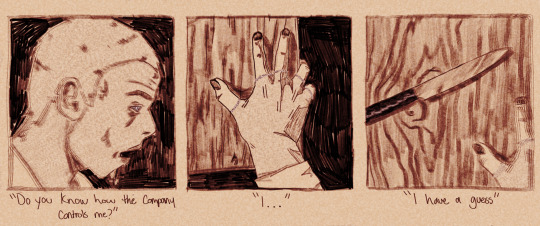
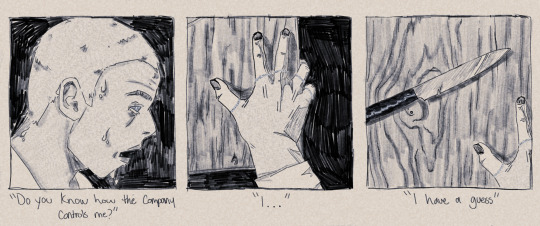
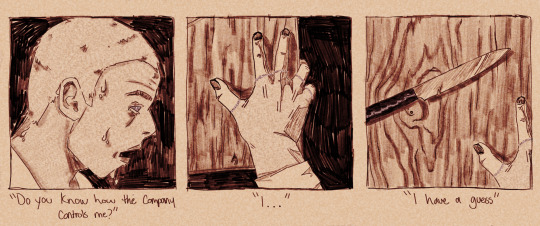
SUIT: There is something preventing me from removing it myself but... there is a carving knife on my desk
ID in alt
#archive 81#digital art#suit archive 81#caroline levi#a81#archive 81 podcast#archive 81 netflix#<- the hater is filling the tag out of vile disgust
48 notes
·
View notes
Text
Two preliminary polls will go up April 26th, at 5pm EST!
(This is for characters of the same fandoms that got multiple but the same amount of submissions)
Below is a list of characters that only got ONE submission, I currently have 56/64 slots filled in.
If you would like to get any of these characters/fandoms into the tournament, send in a submission for them in asks if you didn’t get to in the first place!
(Note: There are 119 in total on this list. I haven’t done research into every single one listed below due to large amount but am listing for additional submissions.)
1. D&D- Changelings (1
2. D&D- Mimics (1
3. Dungeons and Daddies- Hermies the Unworthy (1
4. Dungeons and Daddies- Scam Likely (1
5. Dungeons and Daddies- Mark Likely
6. Fruits Basket- Kyo Sohma (1
7. Mystery Skulls Animated- Mystery (1
8. Just Roll With It- Ob’nockshai (apparently people hate him) (1
9. Just Roll With It- Rumi (1
10. Inuyasha- Shippo (1
11. Ena- Ena (1
12. Barbapapa- Barbapapa (1
13. Barbapapa- Barbalib (1
14. Barbapapa- Barbalala (1
15. Barbapapa- Barbabeau (1
16. Barbapapa- Barbazoo (1
17. Barbapapa- Barbabright (1
18. Overlord- Pandora’s Actor (1
19. Creature Court- Velody of the Vittorine (1
20. New Danganronpa V3- Tsumugi Shirogane (1
21. Deltarune- Jevil (1
22. Mirrorworld series- Fox/Celeste Auger
23. Switchers Trilogy- Tess (1
24. Hellsing- Alucard (1
25. Reflets d’Acide- The Doppelganger (1
26. Kirby- Void (1
27. Kirby- Morpho Knight (1
28. Kirby- Kirby (1
29. Invader Zim- Invader Zim (1
30. Ace Attorney- Maya Fey (1
31. Infinity Train- Alan Dracula (1
32. Bungou Stray Dogs- Natsume Souseki (1
33. Soul Eater- Tsubaki Nakatsukasa (1
34. Soul Eater- Blair (1
35. Soul Eater- Ragnarok (1
36. What We Do In The Shadows (film)- Vladislav the Poker (1
37. Little Witch Academia- Akko! (1
38. Genshin Impact- Rex Lapis/Zhongli (1
39. Genshin Impact- Venti (1
40. WarioWare- Orbulon (1
41. Hello From the Hallowoods- Yaretzi (1
42. League of Legends- Neeko (1
43. Kemono Jihen- Kon (1
44. CatGhost- Elon Doyle (1
45. The Magnus Archive- Not Them (1
46. The Hex, and Inscryption breifly- Dark clown sado (1
47. Your Imaginary Friend- Mimi (1
48. Dirk Gently's Holistic Detective Agency (Netflix 2016)- Mona Wilder (1
49. Hugtto Precure- Hariham Harry (1
50. Natsume's Book of Friends- Nyanko-Sensei (1
51. Kingdom Hearts- Donald Duck (1
52. Uchouten Kazoku- Yasaburou Shimogamo (1
53. Lorien legacies- Eight (1
54. Parahumans- Genisis/Jess (1
55. Parahumans- Oliver (1
56. Homestuck- Kanaya's chainsaw (1
57. Blue Öyster Cult- Imaginos/Desdinova (1
58. Spirited Away- Howl pendragon (1
59. Spirited Away- Yubaba (1
60. Fairy Tale- Mirajane Strauss (1
61. Fairy Odd Parents- Wanda and Cosmo (1
62. Celtic Mythology- Selkies (1
63. Treasure Planet- Marco (1
64. ROTTMNT- Sunita (1
65. Space Dandy- the Chameleonian (1
66. Naruto- Naruto (1
67. Suite Precure- Siren (1
68. Undertale- Mettaton (1
69. Paranatural- Dimitri Danger (1
70. Ranma 1/2- Ranma (1
71. Ranma 1/2- Ryoga (1
72. Tokyo Mew Mew- Ichigo (1
73. Princess Tutu- Duck (1
74. Yume Nikki- Madotsuki(1
75. BIONICLE- Krahka (1
76. Greek Mythology- Zeus (1
77. This is how you lose the time war- Blue (1
78. Magia Record- Rena Minami (1
79. Divinity: Original Sin II- Fane (1
80. My Hero Academia- Tamaki Amajiki (1
81. My Hero Academia- Himiko Toga (1
82. Elden Ring- Mimic Tear (1
83. Lumine- Lumine (1
84. BNA- Michiru Kagemori (1
85. Wow- Ysera (1
86. Good Omens- Aziraphale (1
87. Final Fantasy XIV- Omega (1
88. The Earthsea Cycle- Tehanu (1
89. The Earthsea Cycle- Ged (1
90. Animal Crossing- Blanca (1
91. True Blood- Sam Merlotte (1
92. Heaven Official's Blessing (or, Tian Guan Ci Fu) by MXTX- Hua Cheng (1
93. Guardian (2018 web drama)- Da Qing aka Damn Cat (1
94. Attack on Titan- Lara Tybur/Warhammer titan (1
95. The Binding of Isaac: Rebirth- Delirium (1
96. Throne of Glass- Lysandra (1
97. Throne of Glass- Rowan Whitethorn (1
98. Touhou- Mamizou Futatsuiwa (1
99. The Last Dragonlord- Linden Rathan (1
100. Batman- Clayface (1
101. Generator Rex- Rex Salazar (1
102. That Time I Got Reincarnated as a Slime- Rimuru Tempest (1
103. Spooky's Jump Scare Mansion- Specimen 7 (1
104. Chaotic- Iparu (1
105. Dragon Ball- Puar (1
106. American Dragon Jake Long- Jake Long (1
107. Vampire The Masquerade- The Eldest (1
108. Legion of Super Heroes- Chameleon boy (1
109. Mistborn- TenSoon (1
110. The dresden files- Goodman Grey (1
111. Smallville- Tina Greer (1
112. Lobotomy Corporation / projectmoon- Nobody Is (1
113. Terminator 2: Judgement Day- T-1000 (1
114. Casey and Andy- Satan (1
115. xkcd- Beret Guy (1
116. One Piece- Bentham (Bon Clay) (1
117. Devil May Cry- Trish (1
118. Real Life- Trans person reading this (1
119. Wings of Fire- Chameleon (1
18 notes
·
View notes
